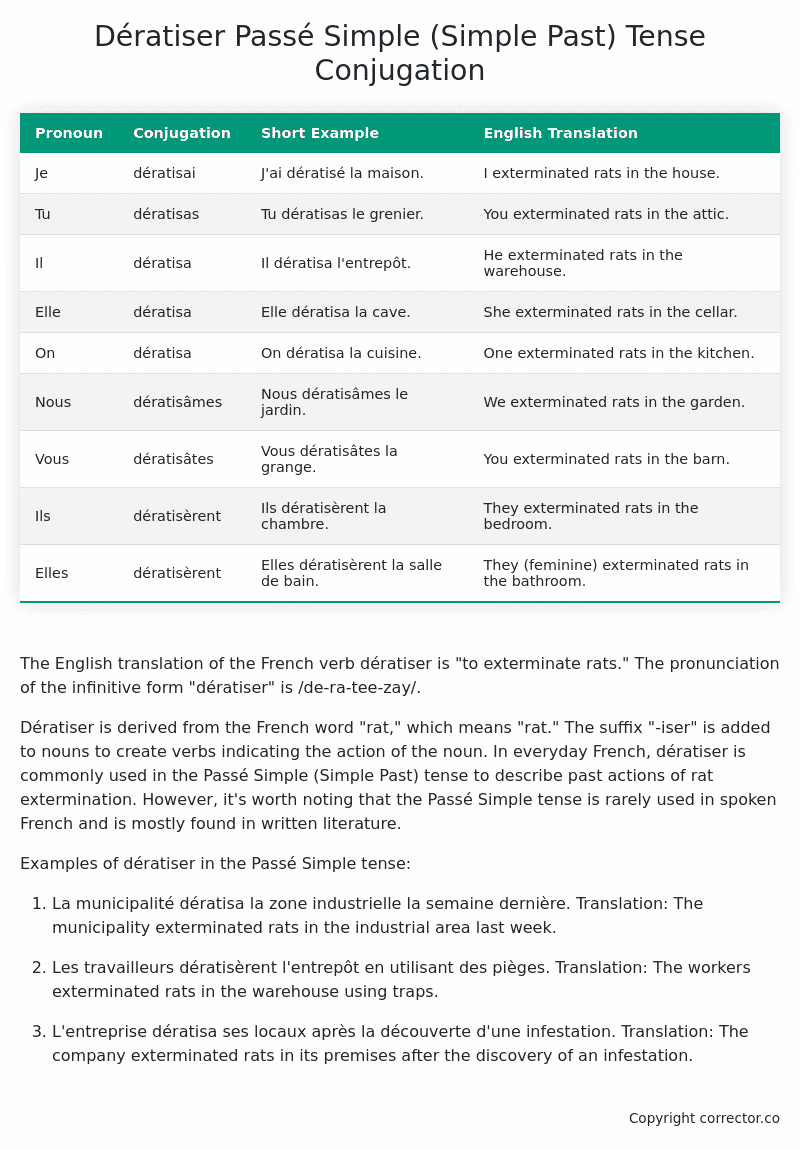Passé Simple (Simple Past) Tense Conjugation of the French Verb dératiser
Introduction to the verb dératiser
The English translation of the French verb dératiser is “to exterminate rats.” The pronunciation of the infinitive form “dératiser” is /de-ra-tee-zay/.
Dératiser is derived from the French word “rat,” which means “rat.” The suffix “-iser” is added to nouns to create verbs indicating the action of the noun. In everyday French, dératiser is commonly used in the Passé Simple (Simple Past) tense to describe past actions of rat extermination. However, it’s worth noting that the Passé Simple tense is rarely used in spoken French and is mostly found in written literature.
Examples of dératiser in the Passé Simple tense:
-
La municipalité dératisa la zone industrielle la semaine dernière.
Translation: The municipality exterminated rats in the industrial area last week. -
Les travailleurs dératisèrent l’entrepôt en utilisant des pièges.
Translation: The workers exterminated rats in the warehouse using traps. -
L’entreprise dératisa ses locaux après la découverte d’une infestation.
Translation: The company exterminated rats in its premises after the discovery of an infestation.
Table of the Passé Simple (Simple Past) Tense Conjugation of dératiser
| Pronoun | Conjugation | Short Example | English Translation |
|---|---|---|---|
| Je | dératisai | J’ai dératisé la maison. | I exterminated rats in the house. |
| Tu | dératisas | Tu dératisas le grenier. | You exterminated rats in the attic. |
| Il | dératisa | Il dératisa l’entrepôt. | He exterminated rats in the warehouse. |
| Elle | dératisa | Elle dératisa la cave. | She exterminated rats in the cellar. |
| On | dératisa | On dératisa la cuisine. | One exterminated rats in the kitchen. |
| Nous | dératisâmes | Nous dératisâmes le jardin. | We exterminated rats in the garden. |
| Vous | dératisâtes | Vous dératisâtes la grange. | You exterminated rats in the barn. |
| Ils | dératisèrent | Ils dératisèrent la chambre. | They exterminated rats in the bedroom. |
| Elles | dératisèrent | Elles dératisèrent la salle de bain. | They (feminine) exterminated rats in the bathroom. |
Other Conjugations for Dératiser.
Le Present (Present Tense) Conjugation of the French Verb dératiser
Imparfait (Imperfect) Tense Conjugation of the French Verb dératiser
Passé Simple (Simple Past) Tense Conjugation of the French Verb dératiser (You’re reading it right now!)
Passé Composé (Present Perfect) Tense Conjugation of the French Verb dératiser
Futur Simple (Simple Future) Tense Conjugation of the French Verb dératiser
Futur Proche (Near Future) Tense Conjugation of the French Verb dératiser
Plus-que-parfait (Pluperfect) Tense Conjugation of the French Verb dératiser
Passé Antérieur (Past Anterior) Tense Conjugation of the French Verb dératiser
Futur Antérieur (Future Anterior) Tense Conjugation of the French Verb dératiser
Subjonctif Présent (Subjunctive Present) Tense Conjugation of the French Verb dératiser
Subjonctif Passé (Subjunctive Past) Tense Conjugation of the French Verb dératiser
Subjonctif Imparfait (Subjunctive Imperfect) Tense Conjugation of the French Verb dératiser
Subjonctif Plus-que-parfait (Subjunctive Pluperfect) Tense Conjugation of the French Verb dératiser
Conditionnel Présent (Conditional Present) Tense Conjugation of the French Verb dératiser
Conditionnel Passé (Conditional Past) Tense Conjugation of the French Verb dératiser
Conditionnel Passé II (Conditional Past II) Tense Conjugation of the French Verb dératiser
L’impératif Présent (Imperative Present) Tense Conjugation of the French Verb dératiser
L’impératif Passé (Imperative Past) Tense Conjugation of the French Verb dératiser
L’infinitif Présent (Infinitive Present) Tense Conjugation of the French Verb dératiser
L’infinitif Passé (Infinitive Past) Tense Conjugation of the French Verb dératiser
Le Participe Présent (Present Participle) Tense Conjugation of the French Verb dératiser
Le Participe Passé (Past Participle) Tense Conjugation of the French Verb dératiser
Struggling with French verbs or the language in general? Why not use our free French Grammar Checker – no registration required!
Get a FREE Download Study Sheet of this Conjugation 🔥
Simply right click the image below, click “save image” and get your free reference for the dératiser Passé Simple tense conjugation!

Dératiser – About the French Passé Simple (Simple Past) Tense
Formation
Usage
Narration
Historical Context
Interactions with other tenses
Passé Composé
Imparfait
Conditional and Subjunctive
Summary
I hope you enjoyed this article on the verb dératiser. Still in a learning mood? Check out another TOTALLY random French verb conjugation!


